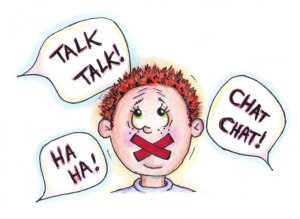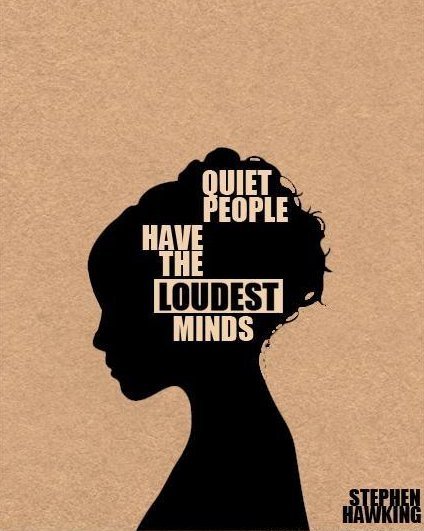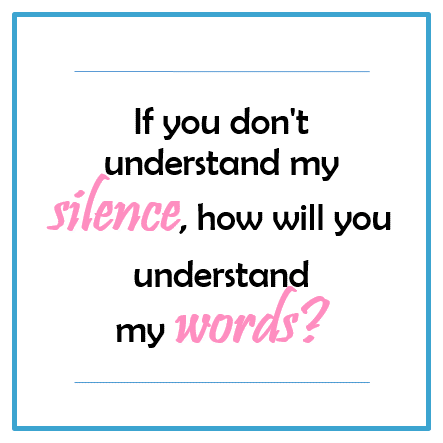
We were sitting in the psychologist’s room with blank expressions on our faces. This was not what we were expecting to hear, she was here for school readiness assessments…
This was our first introduction to Selective Mutism. Our little girl was diagnosed with Selective Mutism. The psychologist explained it as a social phobia that prevents children speaking in certain social or public situations such as school.
Of course we’ve noticed her unwillingness to speak when we dropped her off at pre-school, when classmates greeted her and she looked the other way, when she was asked a question by her teacher and she froze, but we thought it was just a reluctance to speak up due to shyness. She is a quiet, introvert child so, I mean, it’s normal! All children go through these phases! She’ll warm up soon! Or so we thought.
Dr Jones says children affected don’t have any physical difficulty speaking; they are able to speak easily and freely in environments where they feel at ease, like at home, but in situations where they feel anxious and uncomfortable, they can’t speak at all.

Imagine you are afraid of spiders…now imagine having to pick up a tarantula!!
The expectation of talking to others triggers a freeze response with feelings of panic, which can ultimately lead to extreme forms of anxiety disorder.
It’s like a cycle:

Coming to think of it now, what the doctor said makes sense. Her refusal to speak when we are with friends, the tummy ache and nausea she gets every morning when we drop her off at school or sometimes when we tuck her in at night… Dr Jones says some kids experience more physical symptoms such as vomiting, joint pains, headaches, chest pain and diarrhea.
“It’s her anxiety not her intelligence,” I still hear Dr Jones saying. She is school ready, it is not affecting her intellect at all but on a social level, having to interact with other children and teachers will be challenging. Even sports activities will affect her on a deeper level than normal shyness as Selective Mutism is actually a social anxiety disorder. It usually co-exists with shyness or social anxiety.

Neither I nor her dad is familiar with this disorder so she couldn’t have inherited it from us. I mean yes, she was born prematurely, could that have triggered the anxiety?
Upon further investigation, I’ve discovered that most children are believed to have inherited genes that may have played a role in predisposing them to anxiety.
So how do we help her?

- DO Understand That Selective Mutism Is Not a ‘Choice’
- DO lay off the Questioning. For children with selective Mutism, speaking is hard. When you see your child clamming up, lay off the questions. Pushing them to speak will only increase their anxiety and reduce the likelihood that they will be able to talk.
- DO Describe and Praise Their Behaviours. When you see your child becoming anxious in a speaking situation, you can take the pressure off by simply describing what you see your child doing and praising their efforts to participate in activities, whether verbally or nonverbally.
- DO Give Your Child Time to Speak. Often, adults ask children questions in a rapid-fire format with little breathing room in between. Children experiencing selective mutism often have a delay before speech, so always wait at least five seconds after you ask a child with selective mutism a question to give them a chance to answer.
- DO Notice Your Own Reaction to Your Child’s Silence. When a parent sees their child freeze or hide when asked a question, it will likely be that parent’s natural, caring response to speak for the child. This may reduce both a parent and child’s anxiety, but it can also prevent the child from overcoming mutism.
- DON’T Offer Rewards for Something Your Child Can’t Do. Since mutism is not a choice, but rather an inability to speak driven by anxiety, asking your child to speak in exchange for a reward is like offering your artistic spouse a million dollars to complete a calculus question. It comes from a place of kindness, but is rarely helpful.
- DON’T Try to Understand the ‘Rules’ of a Child with Selective Mutism. Children with selective mutism may speak to one teacher but not the other, their grandmother but not their grandfather, one of four aunts, and so on. Children with selective mutism divide the world into those people, places, and activities in which they speak and those in which they do not. These boundaries are rigid, and trying to understand the why behind your child’s rules may only cause frustration.
- DON’T Criticize Your Child. This one seems obvious, but criticism can hide in seemingly innocuous phrases. “You spoke so well last week. What’s going on this week?” or “Look how your brother is talking, can you try to be like him?” may not sound overtly critical to parents, but are often experienced as critical by children.
- DON’T Give Up. Many children with selective mutism never receive appropriate treatment. Many parents who seek help for their children report their own struggles with selective mutism throughout their lives. I applaud those parents who are unwilling to accept that their child should suffer in silence and encourage all parents to persevere in their search for treatment in the face of being repeatedly told, “Your child is just shy.”
Acknowledgement: Adapted from the work of Dr. Steven Kurtz.
Source
Treatment:
Behaviour therapy is the main treatment for Selective Mutism.
Read all about it here
What I want the outside world to know
Courtesies such as please, thank you, hello, and goodbye may be some of the most difficult words a child with selective mutism will learn to say. Unfortunately, they are also the words parents often push for the hardest because they don’t want their child to be perceived as being rude. The reality is that these children are anxious, not rude, and most will grow up to be thoughtful, polite adults.
Source

Conclusion:
Extra reading materials:
Selective mutism
Selective mutism in children
Do's and Don'ts
Selective mutism explanations

I am all to familiar with Selective Mutism. My son didn’t say his first words until he was nearly 3 and a half. It wasn’t until we discovered that he was also Autistic that we had an answer for his mutism. Before that we were really walking blind trying to understand why he wouldn’t speak.
It can be very difficult, especially when they can’t even communicate their most basic needs to you. Those simple words of “I love you” were more than he could manage until he turned 6. It was the best day ever.
The advise in your post is spot on. Do not push them to talk, it will only set them back.
Great post!!!
Thank you for your post. I have a son that will soon be 18, and he was diagnosed with ADHD, OCD and Major depressive disorder when he was 6. It devastated me, and left me with a lot of questions.
I researched all I could, became his advocate and home schooled him as the South African Education department doesn't cater for children with learning disabilities.
During those early years home schooling and medication was frowned upon. We tried mainstream schooling and natural supplements, and it didn't work. To see my son being bullied or misunderstood everyday, broke my heart.
In the end we tried homeschooling with medication, and my son blossomed. Unfortunately I was and still am a single parent and our decisions didn't carry his dad's approval, but I bit the bullet and invested in my son all on my own.
Today, he's a well balanced young adult and I am so proud of him.
My message to you is: Trust your instinct as a mom, and ignore other people's ignorance about your child's condition. It will all be worth while in the end.
God bless.
Thank you @riana67 for such an inspiring comment! I am happy to hear that your son turned out to be fine and it's one hell of a motivation for me as a parent.
Good luck and thank for reading!
children should be invited to speak and be more active both at school and at home friends. thus ana will be more intelligent and understand what he is doing. if he does not talk often, then talk to him and ask him why he keeps quiet. I also do not understand this because I have never felt and experienced such things. thank you for writing friend, this will help us in dealing with children with problems like this.
This is very informative and useful post that you have shared. Selective motivism is a complex childhood anxiety disorder characterized by a child's inability to speak and communicate effectively is select social settings such as School.
Thanks for this great information and suggestions.
As a researcher of communication, this was a very interesting story from the parental point of view, while providing sound advise for others that may be in the same position. I appreciate your contribution and am happy to know that your child has such a strong ally in her parents that are working to support her growth!
Thanks alot @thisismework. Appreciate your lovely comment!
Very interesting and sensitive text. We have a child with dyspraxia who has been mutistic for a long time. It is a challenge to become an expert on your own behalf. And this despite the fact that I myself am a psychiatrist with a special interest in child psychiatry and developmental peculiarities.
I guess whether we are trained in the field or not, the best thing we can do for them is just to support and understand them.
Thanks for your comment!
excellent post, happily re-steemed. Very good of you to spend the time to bring this data together and put it on steemit. Had never heard of this before now. Thank you. Education is the key to it all. Good luck with raising awareness in the future
Thank you for this post, I really learnt something, and that is the point I suppose! Sharing subjects like this leads to a more caring environment for our children, and contributes to the realisation that there is not a one size fits all approach to parenting and schooling.
That's true, I couldn't have said it better myself.
Thanks for reading @onetree.
My personal take on selective mutism
....A child being shy and a 'medical profession' trying to justify their highly paid salaries, and useless existence... .
If they swept the roads, rather than come up with more ludicrous definitions that are just human behavior,they would do a lot more good for society.
They just wouldn't have new BMW's to drive. Shame.
I get what you're saying. Well, either way, if it has a name, people are more willing to take it seriously. Especially teachers.
First time learning this word, "selective mutism". I think I probabaly have selective mutism when i was young LOL. On second thought, i think quite a number of children these day kind of showing symptoms of "selective mutism" as well, just that may be their parents are not aware of it. Hmm...
Is your little girl undergoing behavioral therapy now? How is it going? Hope everything's good!
Hi @jiafui. Thanks for reading.
Yes she is doing therapy and it's working great but it's not constant. It's an "on again, off again" treatment but at least we can say, it works. Thanks for asking!
my mom gets selective mutism when my dad is in the wrong.
very good and useful text for parents with children with any kind of anxiety :)
Very interesting topic you have written about, it's something out of mainstream, really special. Thank you!
How is the therapy working for your daughter?
All the best, Coco